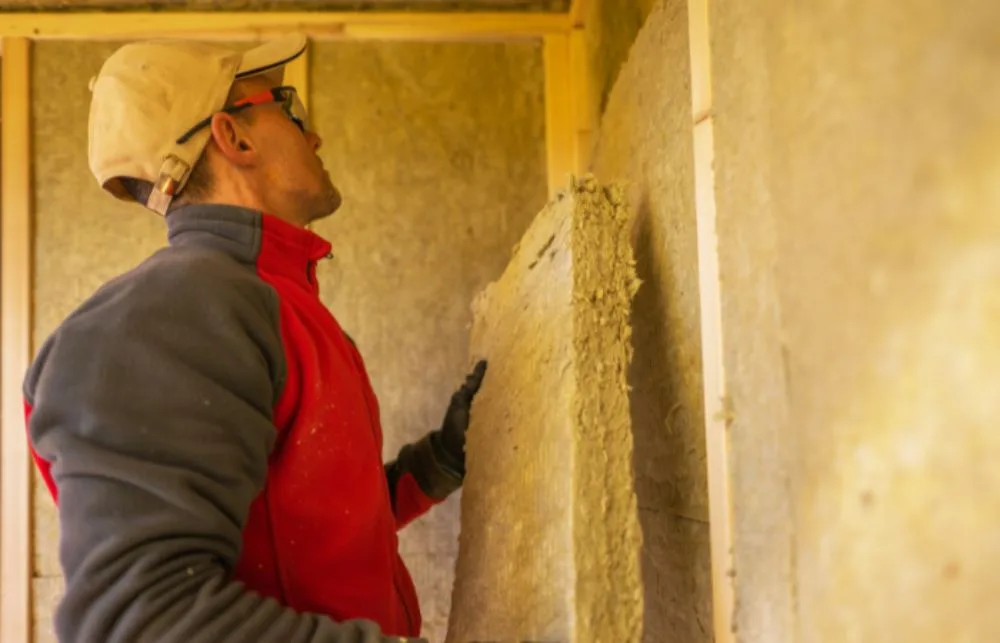Residential insulation contractors are professionals who specialize in installing insulation materials in homes to improve energy efficiency and comfort. Insulation is a crucial component of a home’s thermal envelope that helps to regulate indoor temperatures by reducing the transfer of heat between the inside and outside environments.
In this blog, we’ll go over the vital aspects of residential insulation contractors and explore the materials they work with, the services they provide, and the key considerations when choosing the right contractor for your home.
What Are Insulation Contractors?
Insulation contractors specialize in installing and maintaining insulation materials in buildings, with a specific focus on improving energy efficiency, thermal comfort, and overall building performance. Their primary goal is to create a thermal envelope within a structure that minimizes heat transfer between the interior and exterior environments.
Types of Insulation Contractors
The types of insulation contractors can be categorized based on the specific areas of expertise and the materials they work with. Here are some common types:
- Residential Insulation Contractors
These contractors focus on installing insulation in homes and residential buildings. They work in areas such as walls, basements, attics, and crawl spaces to enhance energy efficiency and thermal comfort for homeowners.
- Commercial Insulation Contractors
They provide insulation solutions for commercial and office buildings, retail spaces, and other non-residential structures. Their work may involve different materials and methods to meet the specific needs of larger spaces.
- Industrial Insulation Contractors
These contractors work in industrial settings such as factories, manufacturing plants, and processing facilities. They install insulation to regulate temperatures in industrial spaces, reduce energy costs, and enhance safety.
- HVAC Insulation Contractors
HVAC (Heating, Ventilation, and Air Conditioning) insulation contractors specialize in insulating components of HVAC systems, such as ductwork and pipes. Proper insulation in these systems helps maintain temperature control and efficiency.
- Spray Foam Insulation Contractors
Contractors specializing in spray foam insulation work with materials that expand and form a continuous barrier when applied. Spray foam is commonly used in various applications, including walls, attics, and roofs, providing an effective seal against air infiltration.
- Fiberglass Insulation Contractors
They work with insulation material made from fine glass fibers. This type of insulation is commonly used in residential and commercial buildings and is known for its thermal resistance and sound absorption properties.
- Cellulose Insulation Contractors
They use eco-friendly insulation made from recycled paper with fire-resistant treatment. They often install this type of insulation in attics and walls to make homes more environmentally friendly and energy-efficient.
- Rigid Foam Insulation Contractors
These contractors specialize in materials such as expanded or extruded polystyrene boards. These boards are used in various applications, including exterior sheathing, under-slab, and interior wall insulation.
- Soundproofing Contractors
They focus on installing insulation materials designed to reduce sound transmission between rooms or buildings. They work with materials like acoustic foam, mass-loaded vinyl, and other sound-dampening solutions.
- Fireproofing Contractors
These contractors specialize in installing insulation materials that provide fire resistance. This may involve the application of fireproof coatings or the installation of fire-resistant insulation materials to enhance the safety of a building.
Key Services Offered by Residential Insulation Contractors
Residential insulation contractors offer a range of services aimed at improving the energy efficiency, comfort, and overall performance of homes. These services may vary depending on the contractor’s expertise, the specific needs of the residence, and the type of insulation material used. Here are key services typically provided by residential insulation contractors:
- Insulation Installation
The primary service involves the installation of insulation materials in various areas of the home, including walls, attics, basements, crawl spaces, and floors. Residential insulation contractors assess the residence’s specific needs and determine the appropriate type and amount of insulation required.
- Insulation Inspection and Assessment
Before starting a project, contractors may conduct a thorough inspection of the existing insulation, if any, and assess the overall insulation needs of the home. This helps identify areas where enhancements can be made.
- Attic Insulation Services
Contractors often focus on insulating attics, as this is a critical area for preventing heat loss and improving overall energy efficiency. Attic insulation helps regulate temperature and can significantly impact utility bills.
- Consultation and Education
Residential insulation contractors may provide homeowners with consultation services, explaining the benefits of proper insulation and helping them make informed decisions about materials and installation methods.
- Energy-Efficient Upgrades
In addition to insulation, residential insulation contractors may recommend and install other energy-efficient upgrades, such as energy-efficient windows, doors, and HVAC systems, to further enhance a home’s overall performance.
Choosing the Right Residential Insulation Contractor

Choosing the right residential insulation contractor is crucial to ensure the effectiveness of the insulation installation and the overall improvement of your home’s energy efficiency and comfort. Here are some important considerations to help you select the right contractor:
- Credentials and Certifications
Check if the contractor has the necessary licenses and certifications to operate in your area. Certifications from organizations, such as the Insulation Contractors Association of America (ICAA), can also indicate their commitment to professional standards.
- Experience and Reputation
Look for contractors who have a reliable history of accomplishments in residential insulation. Consider their experience in working with various insulation materials and their reputation within the local community.
- Insurance Coverage
Ensure that the residential insulation contractor has suitable insurance coverage, including liability insurance and workers’ compensation. This safeguards you in the event of accidents or damage to your property during the insulation installation.
- References
Seek references from the contractor and get in touch with past clients. Inquire about their personal experiences, the overall quality of the work performed, and if the contractor successfully met their expectations. This step offers valuable insights into the contractor’s reliability and performance.
- Detailed Written Estimate
Request a comprehensive, written estimate encompassing the work scope, designated materials, labor costs, and any potential additional charges. A clear and transparent estimate is essential for preventing misunderstandings and ensuring mutual understanding between both parties.
- Materials and Techniques
Inquire about the insulation materials the contractor plans to use and their knowledge of various insulation techniques. A knowledgeable contractor can recommend the most suitable materials based on your home’s needs and budget.
- Energy Efficiency Recommendations
A reputable residential insulation contractor should be willing to provide energy efficiency recommendations beyond insulation. They may suggest upgrades to windows, doors, or HVAC systems that complement the insulation and enhance overall energy performance.
- Contract Terms and Conditions
Carefully review the contract terms and conditions. Ensure that it includes details about the project timeline, payment schedule, warranties, and any guarantees on workmanship. If something is unclear, don’t hesitate to ask for clarification.
- Local Building Codes Compliance
Verify that the contractor is knowledgeable about and complies with local building codes and regulations related to insulation. This ensures that the installation complies with safety and performance standards.
- Timeline and Schedule
Talk about the anticipated timeline for the project and confirm if the contractor can align with your schedule. A transparent grasp of the project timeline aids in setting expectations and preventing any potential delays.
- Cost Considerations
While cost is an important factor, it should not be the sole deciding factor. Compare quotes from multiple contractors and take into account the overall value, considering factors like the quality of materials, workmanship, and the contractor’s reputation.
FAQs About Residential Insulation Contractors
What are insulation contractors?
Insulation contractors are professionals specializing in the installation, maintenance, and improvement of insulation systems in various structures, with a focus on enhancing energy efficiency, thermal comfort, and overall building performance. Their expertise involves selecting and installing appropriate insulation materials in specific areas of buildings, such as walls, attics, basements, and crawl spaces.
Which brand of insulation is best?
Determining the best insulation brand depends on various factors, including the specific requirements of a project, the type of insulation needed, and individual preferences. Some well-known insulation brands include Owens Corning, Johns Manville, Rockwool, and CertainTeed. It’s essential to consider factors such as material type, R-value, and the insulation’s suitability for the intended application when choosing the best brand for a particular project.
What is the cheapest insulation material?
The cost of insulation materials can vary based on factors such as material type, R-value, and application. Fiberglass and cellulose insulation are often considered cost-effective options. However, the overall cost-effectiveness depends on factors like installation requirements, energy savings, and longevity. It’s important to balance cost considerations with the insulation material’s performance and suitability for the specific project.
What is the most common insulation material?
Fiberglass is one of the most common insulation materials used in residential and commercial buildings. It is popular due to its affordability, thermal performance, and versatility. Fiberglass insulation comes in various forms, including batts, rolls, and loose-fill, making it suitable for different applications like walls, attics, and floors.
Which insulation is most widely used in residential homes?
Fiberglass and foam board insulation are among the most widely used insulation materials in residential homes. Fiberglass is commonly used in attics, walls, and crawl spaces, while foam board insulation is often used for exterior sheathing and under slab applications.
What is the safest insulation to use?
From a safety perspective, many insulation materials are considered safe when installed correctly and in accordance with manufacturers’ guidelines. Fiberglass, mineral wool, and foam board insulation are generally considered safe. However, it’s essential to adhere to appropriate safety measures during installation and consider factors such as fire resistance, toxicity, and potential allergens when choosing insulation materials.
Conclusion
Residential insulation contractors are specialized professionals for improving homes’ energy efficiency and comfort. These experts, ranging from residential to commercial and industrial insulation contractors, bring diverse skills and knowledge to cater to specific needs. Selecting the right contractor involves considering credentials, experience, materials used, compliance with building codes, and balancing cost with overall value.
Tropic Air Conditioning Inc. stands out in its ability to offer a comprehensive suite of insulation services. We focus on doing quality work, following the rules, and being clear in our communication. If you need reliable insulation solutions, contact us today.




